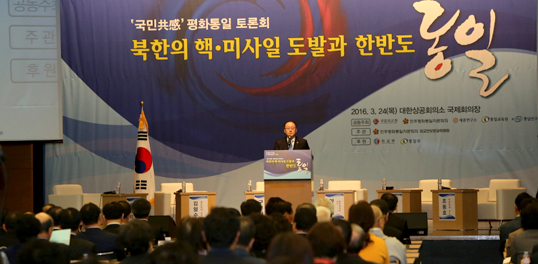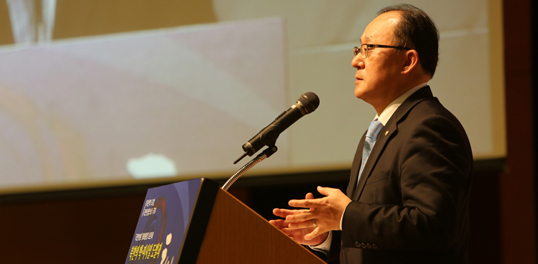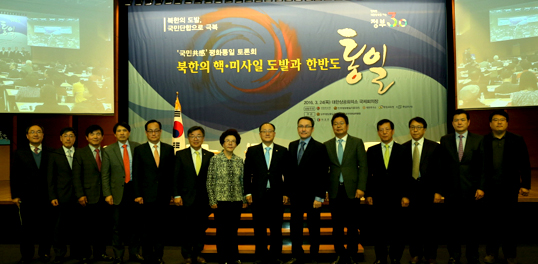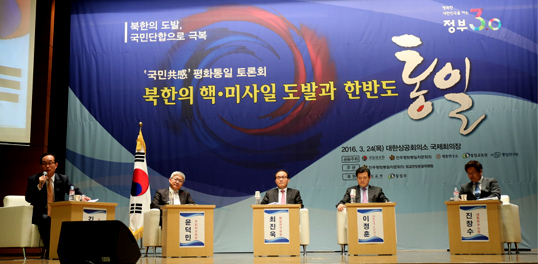| لمجلس الاستشاري الوطني يعقد بنجاح محاضرة حول "مناقشة التعاون الوطني مع الوحدة السلمية" |
|---|
| قسم الاستشارات و النصح, 2016-03-25 |
"National Unification Advisory Council successfully holds the "National Empathy Peaceful Unification Debate”
Executive Vice-chairperson Yoo Ho-yeol: "We need to overcome North Korea's nuclear and missile provocation by mobilizing public opinion"
The National Empathy Peaceful Unification Debate was successfully held at 2:00pm on March 24th at the International Chamber of Commerce, with over 600 council members, citizens, and students attending.

Debate panorama
This debate, aimed at mobilizing public opinion in the face of the Korean peninsula crisis caused by North Korea's fourth nuclear test and missile provocations, was organized by NUAC’s Diplomacy Security Standing Committee and sponsored by the Ministry of Foreign Affairs and Ministry of Unification, with co-sponsors Korea National Diplomatic Academy, Sejong Institute, Institute of Unification Education, and Korea Institute for National Unification.
Executive Vice-chairperson Yoo Ho-yeol said in his opening remarks that the decision to suspend the operation of the Gaeseong Industrial Complex was a major decision for President Park Geun-hye in solving the North Korean nuclear problem, inviting strong sanctions from the UN Security Council.

Opening Remarks from Executive Vice-chairperson Yoo Ho-yeol
"North Korea also launched a long-range missile in the midst of discussing sanctions against North Korea's nuclear test in the UN security council; thus further angering the international community. We can no longer tolerate the North's behavior, and this requires consistent response from the public and our council members. In addition, since the international community has agreed on an unprecedentedly higher level of sanctions against North Korea, we should use this opportunity to change North Korea and to take a step toward unification through solidary action," Executive Vice-chairperson Yoo Ho-yeol added, calling for the mobilization of public opinion.

Keynote Address from Dulat Bakishev, Kazakhstan's Ambassador to Korea
Afterward, Dulat Bakishev, Kazakhstan's Ambassador to Korea, gave a keynote speech on the subject of "denuclearization experience of North Korea and Kazakhstan.” "Kazakhstan has chosen the path of economic development over nuclear weapons. The voluntary dismantling of its nuclear weapons by the Kazakhstan government has great implications for North Korea's Kim Jong-un regime now more than ever," Ambassador Bakishev said, urging voluntary abandonment by the North Korean regime.

Photo of Chief Co-host, Panel, and Guests Attending the Ceremony
For the first session with the subject of "solution of security environment changes following the missile provocation and nuclear issue of North Korea," Hong Gyu-duck, a professor from Sookmyeong Women's University (chief of the Diplomacy Security Standing Committee of NUAC), gave the opening address. Koo Bon-hak, vice president of Hallym University of Graduate Studies, Kim Yeoul-soo, a professor from SungShin Women's University's College of General Education, Yang Moo-jin, a professor from the University of North Korean Studies, Je Sung-ho, a law professor from Chung-Ang University, and Jo Dong-ho, an Ewha Women’s University professor from the North Korea Department, participated in this discussion.
Professor Koo Bon-hak pointed out that North Korea is not developing nuclear weapons for economic benefits or as a bargaining chip, and that the purpose of Kim Jong-un is to make a US-DPRK peace treaty that induces the withdrawal of US forces and weakening of US-ROK alliance. Still, he stressed that the "most important thing in the North Korean sanction is our own leading role," noting that a unified internal consensus is desperately needed more than ever.
According to Professor Kim Yeoul-soo, while the previous government's sunshine policy for North Korea and principle approach had been implemented, North Korean nuclear weapons deployment looms, and, through strong pressure, the will of North Korea to maintain nuclear weapons should be deterred.
Professor Yang Moo-jin argued that promoting the environment and conditions for voluntary change by North Korea is more effective than our forward action in inducing change by North Korea.
Professor Je Sung-ho stressed that the North Korean human rights situation is "the worst among the worst in the world," citing the need for a strategy for actively linking the North Korean human rights issue with the nuclear issue for the denuclearization of North Korea and noting that, until a change in North Korea's fundamental attitude is witnessed, the international municipal chapter's robust North Korean sanctions should be continued.
Professor Jo Dong-ho proposed that a combination of policy is needed beyond simple engagement and sanctions, illustrating the efficiency enhancement of economic sanctions and construction of the new North Korean nuclear security framework and promoting change by supporting open reform as examples. He added that "creating an economic environment wherein North Korea becomes afraid of sanctions” is needed, along with measures to enhance the effectiveness of sanctions.
Subsequently, in the second session under the subject of “our response for unification," Kim Young-soo, a politics and international diplomacy professor from Seogang University (chief of the Unification Policy Standing Committee of NUAC) presided over the meeting, and Yoon Duk-min, chief of the Institute of Foreign Affairs and National Security, Jin Chang-soo, president of the Sejong Institute, Lee Jung-hoon, ROK Ambassador for Human Rights, and Choi Jin-wook, chief of the Korea Institute for National Unification, etc., participated as members of the panel.

Second Session Panorama
According to Chief Yoon Duk-min, the former government has neither recognized the North Korean issue as our matter nor exhibited decisive behavior, and that, unfortunately, the Gaeseong Industrial Complex shutdown was a difficult decision to make to urge the international community to join, playing a big role in the UN resolution.
In addition, Chief Jin Chang-soo proposed that, since the level of economic sanctions on the North has changed including the third-party sanctions unlike before, we should seize the opportunity to promote the current sanctions in a consistent manner to urge change from North Korea and to hasten the reunification.
Ambassador Lee Jung-hoon noted that the two-headed wagon of North Korean tyranny is nuclear weapon and human rights oppression, and that, based on the lessons of German unification, a shortcut to denuclearization and improved human rights in North Korea is leading the democratization of North Korea.
Chief Choi Jin-wook expressed skepticism about North Korea as a partner for mutual benefits. According to him, since our government is the first party, we need to lead tough international sanctions on North Korea actively.
In particular, this debate could strengthen the purpose of national debate – which is national empathy – through vigorous written questions and answers from the floor following the keynote speech from the panel of experts. The questioners of the floor asked about graphic and realistic issues such as “In a situation wherein North Korea's fifth nuclear test is expected, if North Korea carries out the fifth nuclear test, what measures will the government take? What are realistic measures for inducing the fundamental change of the North Korean regime? The mobilization of national opinion is the core in the current crisis situation; will it indeed be possible?” Such vivid and specific questions provided an opportunity for all participants to think and contemplate together.
Meanwhile, the National Unification Advisory Council is scheduled to hold the second "National Empathy Peaceful Unification Debate" in the second half of this year.